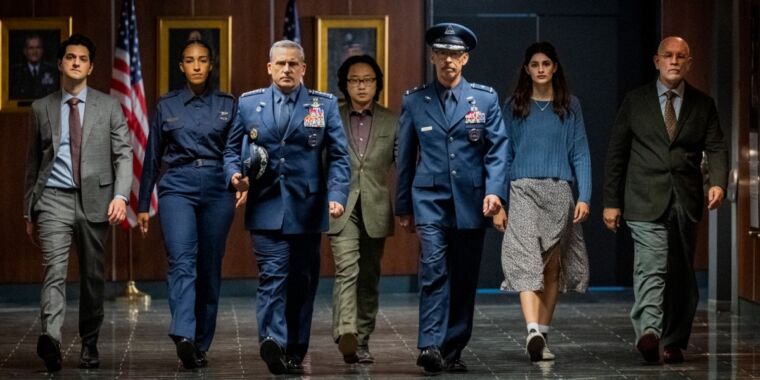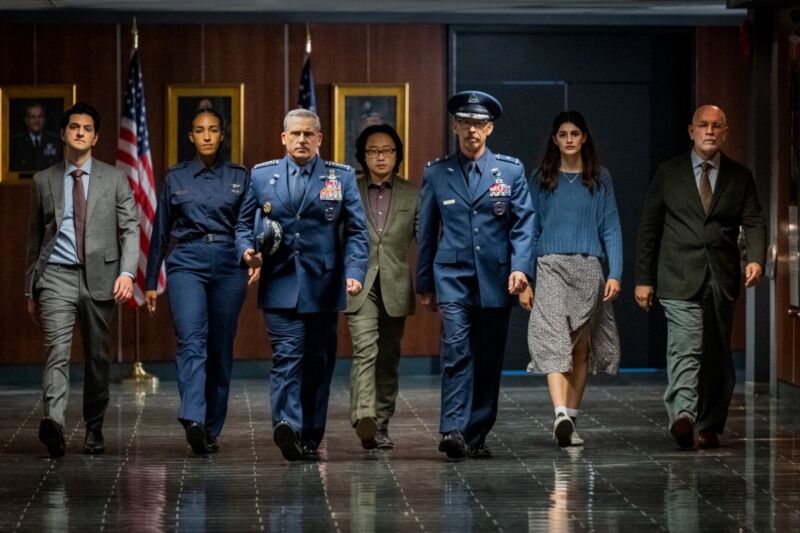
Netflix
The Netflix absurdist comedy Space Force was an Ars favorite in 2020, easily winning a spot on our annual list of best TV shows. We loved the show’s wickedly sly humor, absurdist set-ups, and unexpected heart. It’s finally back with a second season, and while much of the old magic remains intact, it’s starting to lose its luster just a bit—perhaps because we only got seven episodes instead of ten (thanks, never-ending pandemic).
(Spoilers for S1 below.)
As we’ve reported previously, the series was created by Steve Carell and Greg Daniels (who also created Parks and Recreation and Upload). Space Force was inspired in part by the Trump administration’s announcement that it would establish a national Space Force. Carell plays four-star general Mark Naird, a decorated pilot with dreams of running the Air Force.
But in the pilot episode, his dreams for promotion were dashed when he was tapped instead to lead the newly formed sixth branch of the US Armed Forces: Space Force. His new appointment earned the mockery of Naird’s four-star general rival Kick Grabaston (Noah Emmerich). Ever the good soldier, Mark uprooted his family and moved to a remote base in Wild Horse, Colorado where he and a colorful team of scientists and aspiring “Spacemen” struggled to meet the White House insistence on getting American boots on the Moon (again) by 2024, thereby achieving “total space dominance.”
Naird naturally butts heads with his chief scientist, Dr. Adrian Mallory (John Malkovich), a pacifist who has misgivings about working for the Department of Defense. Mark’s wife, Maggie (Lisa Kudrow) is in prison, and his daughter Erin (Diana Silvers) resents having to live in Colorado. The impressive main cast also includes Ben Schwartz as social media director Tony Scarapiducci; Jimmy O. Yang as Dr. Chan Kaifang, Mallory’s lead assistant; Tawny Newsome as Captain Angela Ali, a helicopter pilot who becomes one of the mission’s astronauts; and Don Lake as Brigadier General Bradley Gregory, Naird’s adjutant.
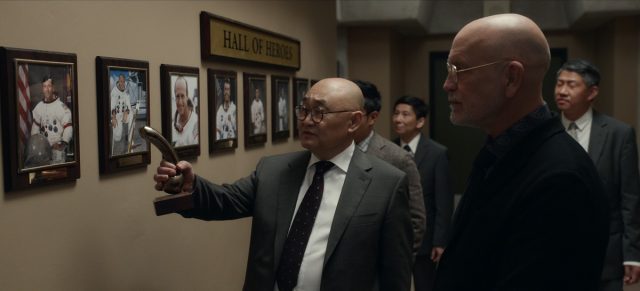
Netflix
Somehow, Space Force succeeds in getting those boots on the moon—but so does China. In the S1 finale, the Joints Chief of Staff were outraged by the Chinese astronauts’ desecration of the Apollo 11 Lunar Flag Assembly (they rolled over it in a rover). Naird’s strategy for a mild attack on the Chinese habitat was over-ruled by the Secretary of Defense, who ordered the destruction of the Chinese lunar base, which would likely trigger all-out war.
Mallory threatened to resign, and Naird decided to defy his orders. That, in turn, led to Grabaston executing a military coup and taking over Space Force, arresting Mallory and Naird. The US astronauts were told to attack the Chinese habitat with wrenches. They returned from this dubious mission to find that the Chinese astronauts had crippled the US base, putting their very survival at risk. And, scene.
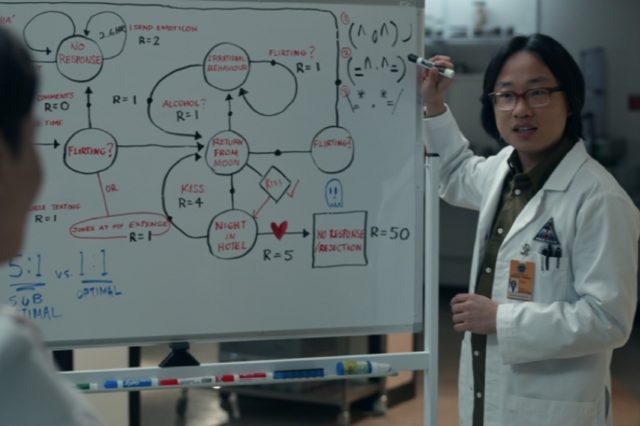
Netflix
That first season was inexplicably panned by critics (viewers were far more positive). Maybe those critics weren’t watching the same series, because we here at Ars loved the show, even though Senior Space Editor Eric Berger had some issues with the depiction of the space-tech. It’s not The Office, nor is it Veep, and that’s a good thing. My take:
Space Force‘s approach to comedy is that of a precision scalpel carefully sheathed to avoid inflicting too much damage with its cuts. There’s an underlying warmth and affection for all these fallible characters trying to do something extraordinary, making us root for them even as we laugh at their pratfalls…. Malkovich shines like a supernova as Dr. Adrian Mallory, a committed pacifist, passionate about his science, working for a military operation (“Space should be a zone of wonder, not of conflict and death”). His languid acerbic wit and genteel sophistication are the perfect foil to Carell’s tightly wound, rough-around-the-edges, everything-by-the-book general, who feels deeply but keeps those feelings bottled up, as a good soldier should. Their unlikely friendship, forged in the fires of a nigh-impossible task, is the heart and soul of the series.
Netflix clearly felt the series performed well enough to warrant a second season. The season picks up a few months after the finale. Angela and her fellow astronauts (including the Chinese) managed to make it back to Earth, and Space Force is now subject to a disciplinary hearing before the new administration’s Secretary of Defense (Tim Meadows). Naird emerges still in charge of Space Force, but the fledgling agency has four months to prove itself—and its budget has been slashed in half.
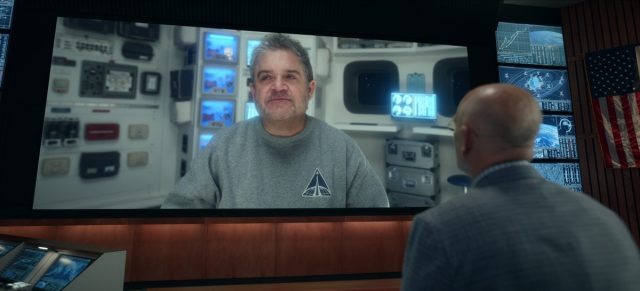
Netflix
Meanwhile, Angela is struggling with her new national hero status and distancing herself from her fledgling relationship with Chan. He handles it pretty much like the lovable nerd he is: by constructing an elaborate flowchart complete with equations to assess the situation. (Dude, take a hint from that returned-text ratio.) Mallory’s beloved manned Mars mission gets the axe, leaving its lone astronaut, Captain Lancaster (Patton Oswalt) in a precarious predicament. Naird’s wife, Maggie, files for divorce, and Erin is ambivalent about going to college, angling to take a gap year instead.
The writers do an excellent job of giving each member of the gifted ensemble cast their moment in the spotlight. Nor so they skimp on small throwaway comic moments that can ornament a scene, like the fact that US satellites in the series are all named after 70s rock bands (Genesis, Rush, Blue Oyster Cult). In the strongest episode, Naird and Mallory host a diplomatic dinner with a visiting delegation from China. Mallory spars with the delegation’s chief scientist, a defiant moon landing denier who needles Mallory by dismissing Neil Armstrong as a “terrific actor.” Meanwhile, Naird, a notorious lightweight, must hold his own, shot-for-shot, against the Chinese general to successfully negotiate a 50/50 split of the moon’s resources.
However, because of the shortened season, S2 just doesn’t have the breathing room to develop the grace notes that so enriched the storytelling of that first season, especially with regard to the interpersonal relationships. The characters don’t really develop much at all, making that whole aspect feel rather thin. I especially missed the subtle moments between Naird and Mallory, although Carell and Malkovich deliver their usual impeccable performances. This is still a delightful, eminently bingeable series and I’m rooting for a full third season without the constraints of shooting during a full-blown pandemic.
The second season of Space Force is now streaming on Netflix.
Steve Carrell and John Malkovich star in the second season of the Netflix comedy Space Force.
Listing image by Netflix

